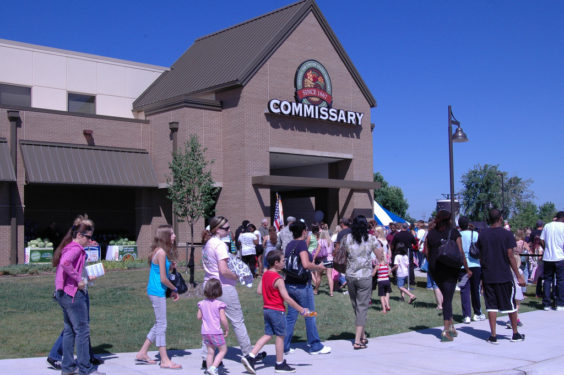
Judging by the vocal reaction from military families late last year, any proposal that would affect their commissary benefit is not a popular one. But a new survey suggests that many military families are actually fine with the idea. Really.
That word comes from First Command Financial Services, a financial planning company that serves members of the U.S. military. Its latest quarterly “Financial Behaviors Index”, as provided to Coupons in the News, asked members of the military what they thought about a recent proposal to eliminate the taxpayer-funded subsidy to U.S.-based Commissary grocery stores. That subsidy allows the stores to sell groceries at cost plus a 5% surcharge, offering a significant savings for military shoppers. Eliminating the subsidy could threaten the commissary system’s very future. 72% of those questioned in the First Command survey agreed that grocery prices are better in commissaries than at off-base grocery stores, and 39% said their food costs would go up without them.
But then First Command goes on to find that “many servicemembers are taking an optimistic view of the cost-cutting proposal.” While 48% are not in favor of any proposal to “eliminate taxpayer-subsidized commissaries”, 44% agree that replacing the commissary subsidy with a monthly food allowance “would give military families the added convenience of shopping anywhere”, and 43% believed it would “give the nation another way to cut government spending.” And respondents said they do the majority of their grocery shopping off base anyway.
“Roughly four out of ten military families consider commissaries to be an important part of their current compensation as well as future retirement benefits,” First Command CEO Scott Spiker said in a news release – which, incidentally, suggests that six out of ten do not. “They are focusing on the positive ways these changes may impact their families and the nation.”
Focusing on the positive? Have a look around the internet, and on this site, and you won’t find a whole lot of positive responses to the proposal. The suggestion to eliminate government funding for commissaries, and have them stand on their own, has been out there for a while. But it gained renewed attention when Oklahoma Republican Senator Tom Coburn included the recommendation in a November report on Pentagon waste, and commissary supporters hotly disputed it (read: “U.S. Military’s Grocery Stores Come Under Fire”).
It could have a lot to do with who, exactly, was included in the survey. First Command says it questioned “middle-class military families”, defined as “senior NCOs and commissioned officers in pay grades E-6 and above, with household incomes of at least $50,000.” That would exclude a large number of those defined by the Defense Commissary Agency (DeCA) as its “heavy shoppers”. “Younger bustling families and senior couples” who are either under age 35 or over 55, with an income of “$30 to $50K+” spend more than $3,000 a year in 34 trips to the Commissary each year, DeCA says. Those with incomes over $100,000 a year only drop by the Commissary 7-8 times a year and spend an annual total of just $450.
Coburn suggests replacing the commissary subsidy with a food allowance of “about $400 per year for the average military family.” That would essentially pay for a year’s worth of Commissary groceries for the higher-income shoppers cited by DeCA. Heavier Commissary shoppers argue that $400 a year – or just over $33 a month – would not be nearly enough to offset the higher prices that commissaries will likely charge if they lose their government subsidy.
There was no action on Coburn’s recommendation in the 112th Congress that wrapped up earlier this year, and no indication it will come up for a vote in the new Congress. So that offers some relief to Commissary supporters, though there are other concerns looming. During the recent “fiscal cliff” debate, lawmakers pushed back sequestration – or automatic Defense Department spending cuts – to March 1. Barring an agreement to avoid the cuts, commissary funding – along with most Pentagon programs – will be reduced by 9.4% this year. That would have “a tremendous impact on store operations including operating hours, product availability and store modernization,” Steve Rossetti of the American Logistics Association tells columnist Tom Philpott.
In the end, is it worth nearly $1.4 billion a year to allow a certain segment of the military population to save on their groceries, while others don’t seem to care so much whether they have a Commissary or not? DeCA says the lowest-income service members who could benefit most from Commissary savings are least likely to actually shop there. Meanwhile, a new report from the Pentagon’s Reserve Forces Policy Board notes that Reservists make up only 3% of commissary users. “The average American lives less than six miles from a supermarket,” the report notes. “In contrast, 54 percent of Reserve and National Guard units are located more than 20 miles away from a military commissary.” The report suggests that a better way of determining the true value of the commissary system is to weigh its costs against the percentage of all service members who actually use it.
“As lawmakers look for ways to cut federal spending,” First Command’s Spiker concludes, “our men and women in uniform are sizing up how those cuts might impact their near- and long-term finances.”
Some, it seems, more than others.
Image source: Defense Commissary Agency











I question who was surveyed as well. My hubby is E6, and we still depend on the commissary to stay on budget…as I know most of our friends regardless of rank do as well. We rely on the commissary for at least 90% of our grocery shopping…on those rare occasions that we have to go elsewhere to pick up a few thing…I’ve found that those few things can at times seem to cost nearly half what it costs for a WHOLE WEEK at the commissary! With the new higher tax rates resulting in lower pays, I know that were we to lose the commissary too, there would be MANY military families hurting!
I understand that we (America) need to cut costs.
We send 1.3 Billion annualy in military aid to Egypt (the Muslim Brotherhood).
We spend 1.4 Billion annualy in food subsidy to Commisaries (American Military families).
Let me see…since we have to choose….
That’s a tough one for Congress to decide now isn’t it?
Not for me. Personally, I’d prefer to subsidize the US Military families. But I’m not in Congress.
I LOVE the commisary…esp when they do Case-lot Sales!! Ever see Wal-mart do that?? Heck NO!! As for AAFES…They say they give back to Military members… take your so-called profits and lower your dag-gum PRICES!!!
“It could have a lot to do with who, exactly, was included in the survey. First Command says it questioned “middle-class military families”, defined as “senior NCOs and commissioned officers in pay grades E-6 and above” ……. They can afford to shop else where, what about the lower enlisted, how about surveying families it’s actually going to affect…. I save over 100 every two weeks shopping at the comi vs Walmart
Totally agree Jeanette! We too save a lot of money on a monthly basis. I do check prices when we go to Walmart and a lot of timebs the prices are higher than they are at the commissary. We do find some things do get competitively priced but still need to keep tabs cause for a while the commissary did beat Walmart in the price for milk. And for diapers the commissary is also starting to get quite competitive also. As now we are having our lil girl in luvs and the price for a large box beats the large boxes at walmart (our usual brand was huggies there). Cost of things is what prompted us to change over to luvs but in many ways they do a really good job.
I’m not ok with this. who did they interview,a bunch of higher up wives? Our family really enjoys saving money at our commissary and there is no way I’m going to find all the organic options we have on post somewhere else! I demand a recount. this is bogus! Not to mention the amount of jobs this will destroy!
I totally hear you. They must have surveyed the General’s wife.
About 20 years ago… we had a new CEO installed and his wife *HATED* the new carpet in her taxpayer funded house. (Wasn’t good enough for her.) She had it ripped out and threw it in the dump.
I scavenged it out of the garbage and re-carpeted my mobile home with it. To this day I still could never afford such fine carpeting. Many thanks to you: Madam of the General…Your Royal Highness.
But you’re right, c and s. I question who they interviewed/surveyed.
The company that conducted this survey must have cherry-picked their demographic to get the results they were paid to get. Commissary shopping has been an essential part of our budget – especially when we were lower enlisted, we could not have survived. I would rather see the government spend less money supporting AAFEES than cut the commissary subsidies.
I cannot afford to shot anywhere but the commissary. The only people that are ok with cutting it are those who can afford to go elsewhere. Grrr….this frustrates me so much I cannot continue to comment.
Mary, I know the feeling.
I don’t know any commissary that sells beer. The PX sells beer, but it’s a totally different organization then the commissary.
You are absolutely correct.
In my area they are two stores: side-by-side w/ a shared parking lot. Maybe that’s not a very obvious enough distinction. Or nmaybe they’re shopping in the “Exchange” and thinking: “Commissary”.
Yes there are some items that are cheaper at an off post/base store but for those of us in Upstate NY the commissary is the best place for affordable groceries! It is always busy when we go shopping. And pay day you are lucky if you get one of the close parking slots. People around here find the commissary a very important part of their lives and it would have a negative affect if it was to ever be taken away. And yes we have gone to other stores in the area to see what they charge and one place we went to we figured we could end up paying 2X the amount that we pay at the commissary.
Yes, agreed. Same way in Guam!
First Command did the survey. There is your FIRST problem. I travel 88 miles twice a month to go to the commissary because it IS that worth it.
Totally agree with this article. I hardly ever shop at the commissary now because I did this research article. Costco gets almost all my business now.
Check out my article comparing grocery stores, Target, Walmart and Costco. http://usmclife.com/2012/04/grocery-store-showdown/
My comment to this statement (“asked members of the military what they thought about a recent proposal to eliminate the taxpayer-funded subsidy to U.S.-based Commissary grocery stores. That subsidy allows the stores to sell groceries at cost plus a 5% surcharge, offering a significant savings for military shoppers.) is that the commissaries do NOT charge cost plus 5%. I went to purchase a 24 pack of Coors Light cans last night for my husband and they were charging $21.49 for something that costs $16-17 at Walmart….The funny thing is they had a 24 pack of Coors Light bottles for $14.99…so THIS is why the Commissary is not getting business. They claim to charge less for items but in truth they charge less for some items and charge CRAZY amounts for others…..
You must be thinking of AAFES, Commissaries are not permitted to sell alcohol of any kind. The last line of your comment sounds exactly like AAFES 😉